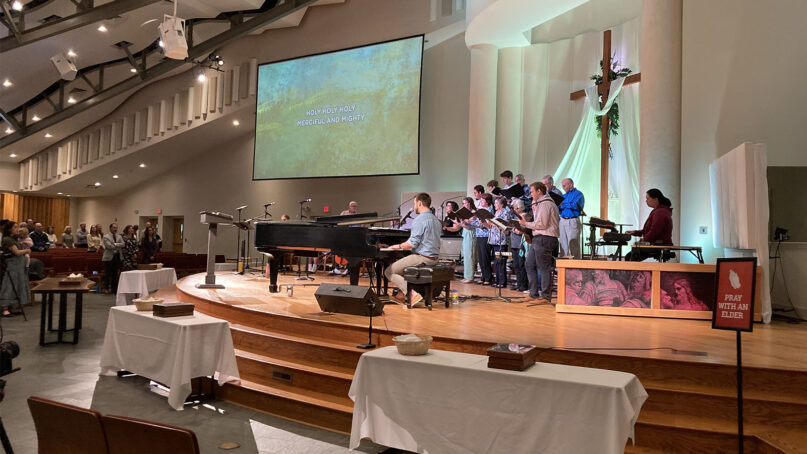CHAPEL HILL, N.C. (RNS) — Sandy Wong still cries when she tells the story.
A few years ago, she registered to attend a women’s retreat at her church, Chapel Hill Bible Church, where she had worshipped for close to 20 years. A Taiwanese immigrant and a mother of three adult children, she often volunteered to help care for children during services and other events. “I love kids,” she said. “They make me happy.”
But on the day of the retreat, the mostly white attendees asked if she would look after their children instead of participating in the gathering.
It wasn’t the first such humiliation for Wong, who often felt as if her race prompted fellow church members to think of her as the “help.” She was so distressed, she moved temporarily to Rockville, Maryland, where she and her husband, Tin-Lup Wong, own a townhouse. In December she moved back, and in early March the couple penned a letter of resignation to the congregation.
”Now we realize what we experienced was racial discrimination,” the Wongs wrote.
The Wongs are among as many as 200 people who have left Chapel Hill Bible Church in recent months — more than 20% of this once flourishing nondenominational congregation in the university town. Several have shared stories similar to the Wongs’.
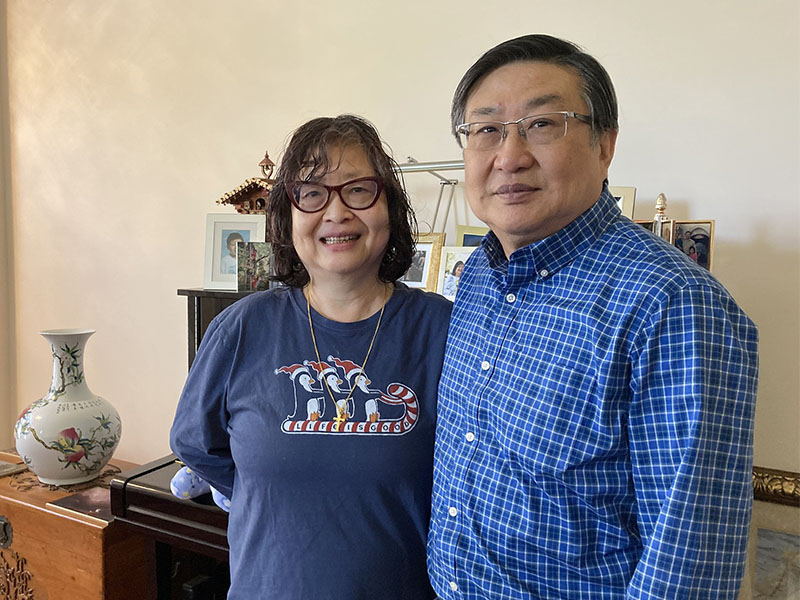
Sandy and Tin-Lup Wong resigned from Chapel Hill Bible Church in March, saying the church racially discriminated against them. They are pictured in their Chapel Hill home on March 14, 2023. RNS photo by Yonat Shimron.
They say church leadership over the past several years has turned inward, drawing boundaries around orthodox beliefs and dismissing or demeaning members’ concerns. That has led to the departures of many families of all races who complained of the church leadership’s lack of transparency and care.
But the loss of nonwhite members has been especially pronounced, especially since white evangelical Christian congregations have made efforts in recent years to repent of the sin of racism and court a younger, more multiracial generation. A 2020 study found that the proportion of evangelical congregations that were multiracial nearly tripled, to 22%, in 2018-19, up from 7% in 1998.
“There’s an absolutely sincere desire to get this right,” said Molly Worthen, a professor of history at the University of North Carolina at Chapel Hill who writes frequently about evangelicals. “A large swath of conservative evangelicals are engaged in this conversation. My sense was that Chapel Hill Bible Church was in that mix.”
The Bible church seemed perfectly positioned to attract a diverse membership, and for many years it did, boasting that 20% of people attending were nonwhite. Jay Thomas, hired as pastor in 2011, is himself biracial; he was born in India and came to the U.S. as a boy.
Many of those nonwhite members were Asian, reflecting Chapel Hill’s demographics: 13% of the town’s residents are of Asian origin, according to the U.S. Census, making them the town’s largest minority group. (Blacks constitute 10% of the population).
But during Thomas’ time as pastor, Chapel Hill Bible has reversed years of interracial progress.
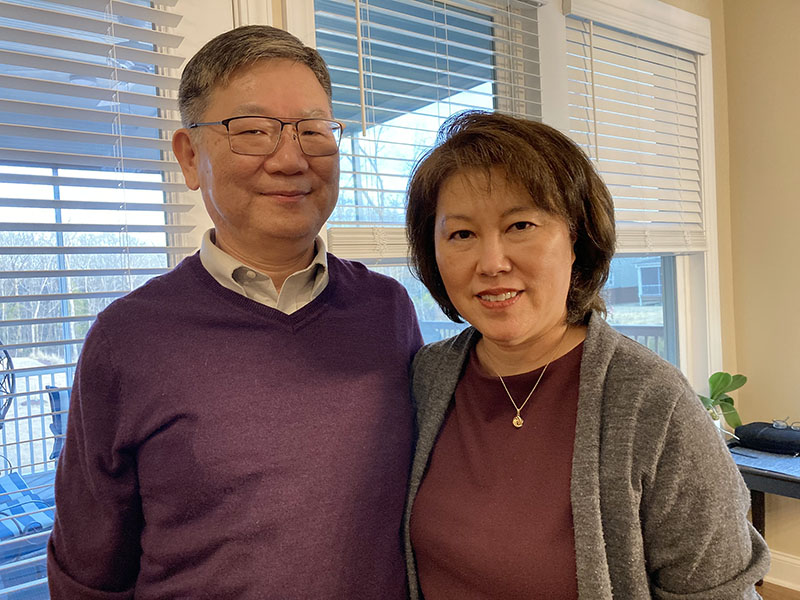
Young and Sarah Whang were members at Chapel Hill Bible Church for more than 20 years. RNS photo by Yonat Shimron
“Sadly, we came to the realization that our church gives lip service to diversity but fails to engage and empathize in a real way with people of color,” Young and Sarah Whang, a Korean American couple, wrote in their resignation letter last year.
.
RELATED: Study: Multiracial churches growing, but racial unity may be elusive
The church declined to respond to a reporter’s inquiries.
“We do not feel it would be beneficial to God’s work in our church or the good of former members who are brothers and sisters in Christ to participate in your inquiry,” Thomas wrote in an email.
The Bible church follows the standard evangelical handbook. Services are a mix of praise songs and hymns followed by a weighty sermon. (Thomas is a graduate of Wheaton College and Gordon-Conwell Theological Seminary. His wife, Rebecca, is the daughter of former Wheaton College President Duane Litfin.)
On its website, the church declares it is “a multi-racial, multicultural, multi-generational” congregation, and that diversity is one of its five “DNA components.” But after Thomas’ arrival, members began noticing that programs engaging the wider community — whether blood drives or a children’s choir that drew from neighborhood children— quietly disappeared.
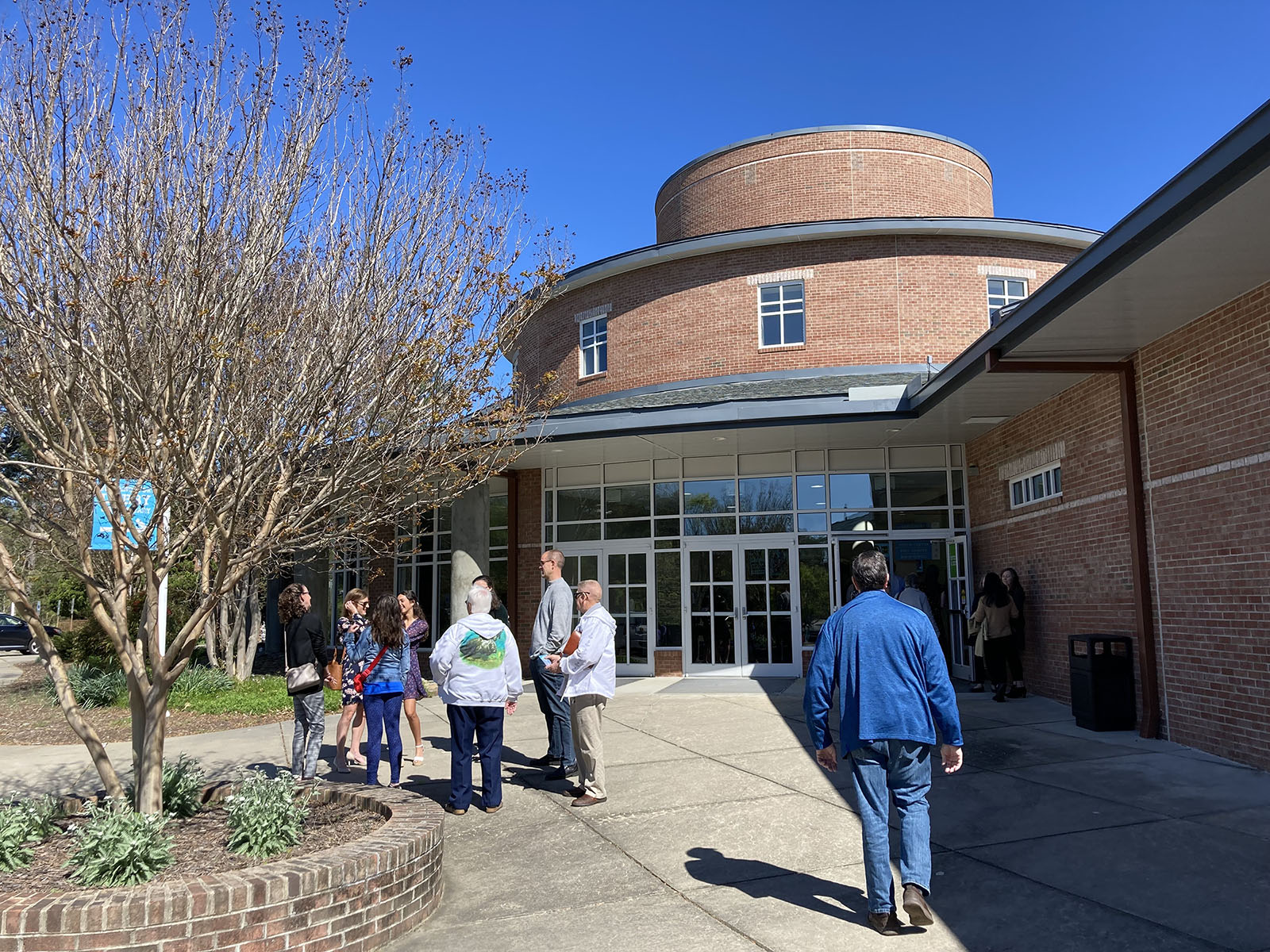
People mingle outside Chapel Hill Bible Church in Chapel Hill, North Carolina, on April 2, 2023. RNS photo by Yonat Shimron
Congregants began to worry that the withdrawal from the community signaled a waning commitment to inclusion. “Over the years, many programs that brought in people from the community were canceled by the pastors,” said Lisa McConnell, who resigned from the church in February. “We witnessed the church becoming more homogeneous.”
Former church members said they noticed church leadership began to value people of high net worth or social standing, who tended to be white. Adherence to doctrine (the church views the Bible as infallible; women cannot serve as elders or lead pastors) became more important than congregational care, they said.
When the church did address the killings of young unarmed Black people by police, especially in the wake of George Floyd’s killing, or the spike in anti-Asian hate crimes that began in 2021, it was fleeting and cautious.
In this, the Chapel Hill Bible Church was not unique. Michael Emerson, professor of sociology at the University of Illinois, said that church racial inclusion efforts suffered under President Donald Trump, who often made incendiary comments about immigrants and Blacks. Many church leaders faced a dilemma, Emerson said: “Do I repudiate it and risk losing many of my white members who may be the biggest donors and who pay my salary? Or do I say, ‘That’s politics, I’m not going to talk about it and try to just skirt the issue.”
When some elders approached the pastor to ask him to publicly respond to the Jan. 6 insurrection at the Capitol, Thomas drafted and made public his response.
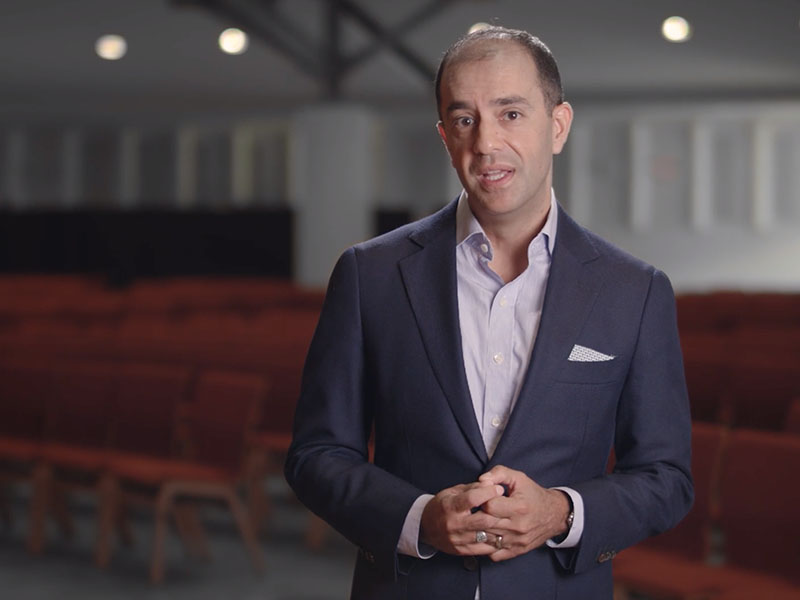
Pastor Jay Thomas in an introductory video for Chapel Hill Bible Church. Video screen grab
“ … political affiliation, policy commitments, political parties, the details of the election, how to interpret the details and meaning of the raid on the Capitol, and the like are not so clear and straight-lined from Scripture that this is the moment to say A is right and B is wrong, or vice-versa,” he wrote.
The statement landed like a bomb.
“It was the kind of Trump language of ‘good people on both sides,’” said Walker Hicks, a white man whose three adopted children are Black. “It just provoked all sorts of distress and dismay and trauma among congregants of color and made them feel more alienated and confused and unsupported.” He and his family left the church in February.
The church dealt with the fallout by dedicating a few hearings to the subject of race, but the congregation was by then embroiled in another leadership crisis involving the executive pastor, who was alleged to have bullied and emotionally abused employees and members.
Two additional external reviews were undertaken, including one by GRACE, a leading nonprofit that investigates church abuses, to assess how leadership communicated with congregants.
When the 64-page GRACE review was released in November, church leaders, citing privacy, pared it down to an 18-page summary. That summary nonetheless included a section devoted to race, laying out numerous complaints from people of color without citing identifying information or quotes.
The review noted that leaders of the Chinese fellowship felt the church had “stopped supporting the ministry.” It cited an elder who brought forth a survey he had personally conducted on racial attitudes at the church. His survey, the report said, was met with “silence” from the lead pastor, staff and other elders.
In 2022, church leadership asked members of a Sunday School class meeting online to discuss race and faith to stop meeting.
“The Chapel Hill Bible church had turned from a church that celebrated diversity to a church that had become inhospitable and unwelcoming to non-majority-culture people,” said Young Whang, an associate professor at the UNC School of Medicine who served as a deacon, chair of the deacon board and elder for three terms before resigning in 2022.
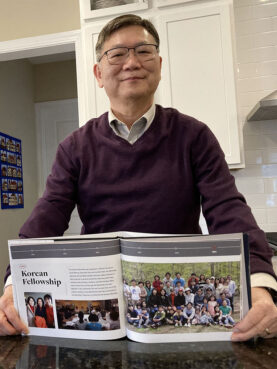
Young Whang and his wife, Sarah, built up a Korean fellowship at Chapel Hill Bible Church during their 20-plus years as members. He posed with a church anniversary book showing the fellowship. Most of its members have now left the church; so have the Whangs. RNS photo by Yonat Shimron
Whang and his wife, Sarah, a family physician, joined the church in 1999. Despite limited Korean language skills (both grew up in the U.S.), the couple took it upon themselves to build a Korean-language fellowship.They pleaded for help in ministering to these newer Christians. They even sought out Korean ministry candidates they hoped the church might hire. The church leadership passed on their recommendations.
Several months after their resignation, the church hired an Argentine of Korean heritage as the college minister.
But the Korean ministry is no more; the Chinese fellowship has been decimated by departures. One of 18 lay elders listed on the website is a Chinese American. The rest are white.
It took Sandy and Tin-Lup Wong a little longer to leave. They had been alienated from the church ever since Sandy was asked to care for the children at the women’s retreat. But there were many other insults.
Sandy Wong said church leaders routinely ignored her, walking away as she was talking to them.
One day when she was playing outdoors with the children, she fell and fainted. None of the adults also supervising the children came to her aid.
“I was so hurt, not just by the way they treated me but because they are doing God’s work,” she said.
On March 25, a group of 50, mostly ex-Bible church members, gathered in the sanctuary of a Methodist church in Chapel Hill for “A service of lament and healing for those wounded by the church.” Many people of color who had left the church attended.
The group told the Methodist minister who hosted them they did not want any preaching. That might be too triggering. They read psalms and Scriptures and sang songs instead. The Methodist church arranged for a few prayer ministers to be on hand.
The service concluded with “It Is Well With my Soul.” Old friends then embraced and prayed for each other’s healing. They vowed to support one another in lieu of the church that had failed them. Then they began talking of organizing more services for those wounded by the church.
RELATED: Shopping for a new church? Your politics may determine which pew fits
